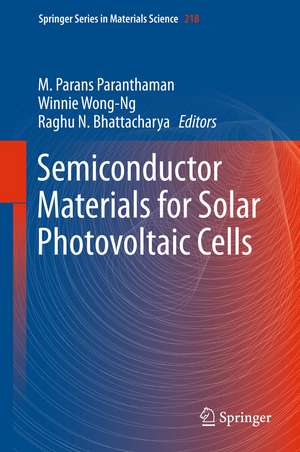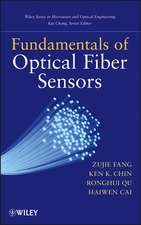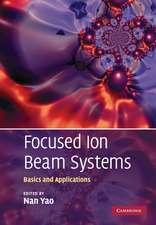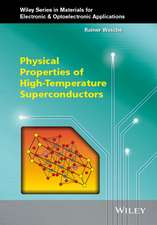Semiconductor Materials for Solar Photovoltaic Cells: Springer Series in Materials Science, cartea 218
Editat de M. Parans Paranthaman, Winnie Wong-Ng, Raghu N. Bhattacharyaen Limba Engleză Hardback – 25 sep 2015
Semiconductor Materials for Solar Photovoltaic Cells presents the current state of the art as well as key details about future strategies to increase the efficiency and reduce costs, with particular focus on how to reduce the gap between laboratory scale efficiency and commercial module efficiency. This book will aid materials scientists and engineers in identifying research priorities to fulfill energy needs, and will also enable researchers to understand novel semiconductor materials that are emerging in the solar market. This integrated approach also gives science and engineering students a sense of the excitement and relevance of materials science in the development of novel semiconductor materials.
· Provides a comprehensive introduction to solar PV cell materials
· Reviews current and future status of solar cells with respect to cost and efficiency
· Covers the full range of solar cell materials, from silicon and thin films to dye sensitized and organic solar cells
· Offers an in-depth account of thesemiconductor material strategies and directions for further research
· Features detailed tables on the world leaders in efficiency demonstrations
· Edited by scientists with experience in both research and industry
| Toate formatele și edițiile | Preț | Express |
|---|---|---|
| Paperback (1) | 640.37 lei 6-8 săpt. | |
| Springer International Publishing – 23 aug 2016 | 640.37 lei 6-8 săpt. | |
| Hardback (1) | 646.62 lei 6-8 săpt. | |
| Springer International Publishing – 25 sep 2015 | 646.62 lei 6-8 săpt. |
Din seria Springer Series in Materials Science
- 18%
 Preț: 1820.22 lei
Preț: 1820.22 lei - 18%
 Preț: 776.09 lei
Preț: 776.09 lei - 24%
 Preț: 689.68 lei
Preț: 689.68 lei - 18%
 Preț: 968.96 lei
Preț: 968.96 lei - 20%
 Preț: 568.94 lei
Preț: 568.94 lei - 18%
 Preț: 953.65 lei
Preț: 953.65 lei - 18%
 Preț: 902.36 lei
Preț: 902.36 lei - 18%
 Preț: 953.65 lei
Preț: 953.65 lei - 20%
 Preț: 948.41 lei
Preț: 948.41 lei - 18%
 Preț: 1143.07 lei
Preț: 1143.07 lei - 18%
 Preț: 1111.53 lei
Preț: 1111.53 lei - 18%
 Preț: 1103.62 lei
Preț: 1103.62 lei - 18%
 Preț: 1225.94 lei
Preț: 1225.94 lei -
 Preț: 473.91 lei
Preț: 473.91 lei - 18%
 Preț: 782.42 lei
Preț: 782.42 lei -
 Preț: 433.47 lei
Preț: 433.47 lei - 18%
 Preț: 1116.40 lei
Preț: 1116.40 lei - 18%
 Preț: 946.24 lei
Preț: 946.24 lei - 18%
 Preț: 945.20 lei
Preț: 945.20 lei - 15%
 Preț: 641.20 lei
Preț: 641.20 lei - 18%
 Preț: 958.56 lei
Preț: 958.56 lei - 18%
 Preț: 1224.36 lei
Preț: 1224.36 lei - 15%
 Preț: 644.82 lei
Preț: 644.82 lei - 24%
 Preț: 833.43 lei
Preț: 833.43 lei - 24%
 Preț: 1060.33 lei
Preț: 1060.33 lei - 18%
 Preț: 964.10 lei
Preț: 964.10 lei - 18%
 Preț: 1224.36 lei
Preț: 1224.36 lei - 18%
 Preț: 1221.20 lei
Preț: 1221.20 lei - 18%
 Preț: 946.87 lei
Preț: 946.87 lei - 18%
 Preț: 1842.31 lei
Preț: 1842.31 lei - 15%
 Preț: 643.34 lei
Preț: 643.34 lei - 18%
 Preț: 1246.32 lei
Preț: 1246.32 lei - 18%
 Preț: 956.81 lei
Preț: 956.81 lei - 18%
 Preț: 953.52 lei
Preț: 953.52 lei - 15%
 Preț: 637.59 lei
Preț: 637.59 lei - 24%
 Preț: 1060.87 lei
Preț: 1060.87 lei
Preț: 646.62 lei
Preț vechi: 760.73 lei
-15% Nou
Puncte Express: 970
Preț estimativ în valută:
123.73€ • 129.51$ • 102.98£
123.73€ • 129.51$ • 102.98£
Carte tipărită la comandă
Livrare economică 31 martie-14 aprilie
Preluare comenzi: 021 569.72.76
Specificații
ISBN-13: 9783319203300
ISBN-10: 3319203304
Pagini: 280
Ilustrații: XIV, 279 p.
Dimensiuni: 155 x 235 x 22 mm
Greutate: 0.59 kg
Ediția:1st ed. 2016
Editura: Springer International Publishing
Colecția Springer
Seria Springer Series in Materials Science
Locul publicării:Cham, Switzerland
ISBN-10: 3319203304
Pagini: 280
Ilustrații: XIV, 279 p.
Dimensiuni: 155 x 235 x 22 mm
Greutate: 0.59 kg
Ediția:1st ed. 2016
Editura: Springer International Publishing
Colecția Springer
Seria Springer Series in Materials Science
Locul publicării:Cham, Switzerland
Public țintă
ResearchCuprins
Introduction to Solar Cells.- c-Si Based Solar Cells.- Amorphous Si Thin Film Solar Cells.- Single Crystalline Si Thin Film Solar Cells.- II-VI (CdTe) Based Thin Film Solar Cells.- II-II-VI (CuInSe2) Based Thin Film Solar Cells.- III-V (GaAs) Based Thin Film Solar Cells.- Earth Abundant Cu2ZnSn(S,Se)4 (CZTSS) Solar Cells.- Dye Sensitized Solid-State Heterojunction Solar Cells.- Polymer-Inorganic Based Solar Cells.- Organic Solar Cells.- Photoelectrochemical Solar Cells.- Other Semiconductor Materials.
Textul de pe ultima copertă
This book reviews the current status of semiconductor materials for conversion of sunlight to electricity, and highlights advances in both basic science and manufacturing. Photovoltaic (PV) solar electric technology will be a significant contributor to world energy supplies when reliable, efficient PV power products are manufactured in large volumes at low cost. Expert chapters cover the full range of semiconductor materials for solar-to-electricity conversion, from crystalline silicon and amorphous silicon to cadmium telluride, copper indium gallium sulfide selenides, dye sensitized solar cells, organic solar cells, and environmentally friendly copper zinc tin sulfide selenides. The latest methods for synthesis and characterization of solar cell materials are described, together with techniques for measuring solar cell efficiency.
Semiconductor Materials for Solar Photovoltaic Cells presents the current state of the art as well as key details about future strategies to increase the efficiency and reduce costs, with particular focus on how to reduce the gap between laboratory scale efficiency and commercial module efficiency. This book will aid materials scientists and engineers in identifying research priorities to fulfill energy needs, and will also enable researchers to understand novel semiconductor materials that are emerging in the solar market. This integrated approach also gives science and engineering students a sense of the excitement and relevance of materials science in the development of novel semiconductor materials.
· Provides a comprehensive introduction to solar PV cell materials
· Reviews current and future status ofsolar cells with respect to cost and efficiency
· Covers the full range of solar cell materials, from silicon and thin films to dye sensitized and organic solar cells
· Offers an in-depth account of the semiconductor material strategies and directions for further research
· Features detailed tables on the world leaders in efficiency demonstrations
· Edited by scientists with experience in both research and industry
Semiconductor Materials for Solar Photovoltaic Cells presents the current state of the art as well as key details about future strategies to increase the efficiency and reduce costs, with particular focus on how to reduce the gap between laboratory scale efficiency and commercial module efficiency. This book will aid materials scientists and engineers in identifying research priorities to fulfill energy needs, and will also enable researchers to understand novel semiconductor materials that are emerging in the solar market. This integrated approach also gives science and engineering students a sense of the excitement and relevance of materials science in the development of novel semiconductor materials.
· Provides a comprehensive introduction to solar PV cell materials
· Reviews current and future status ofsolar cells with respect to cost and efficiency
· Covers the full range of solar cell materials, from silicon and thin films to dye sensitized and organic solar cells
· Offers an in-depth account of the semiconductor material strategies and directions for further research
· Features detailed tables on the world leaders in efficiency demonstrations
· Edited by scientists with experience in both research and industry
Caracteristici
Provides a comprehensive introduction to solar PV cell materials Reviews current and future status of solar cells with respect to cost and efficiency Covers the full range of solar cell materials, from silicon and thin films to dye sensitized and organic solar cells Offers an in-depth account of the semiconductor material strategies and directions for further research Features detailed tables on the world leaders in efficiency demonstrations Edited by scientists with experience in both research and industry Includes supplementary material: sn.pub/extras







